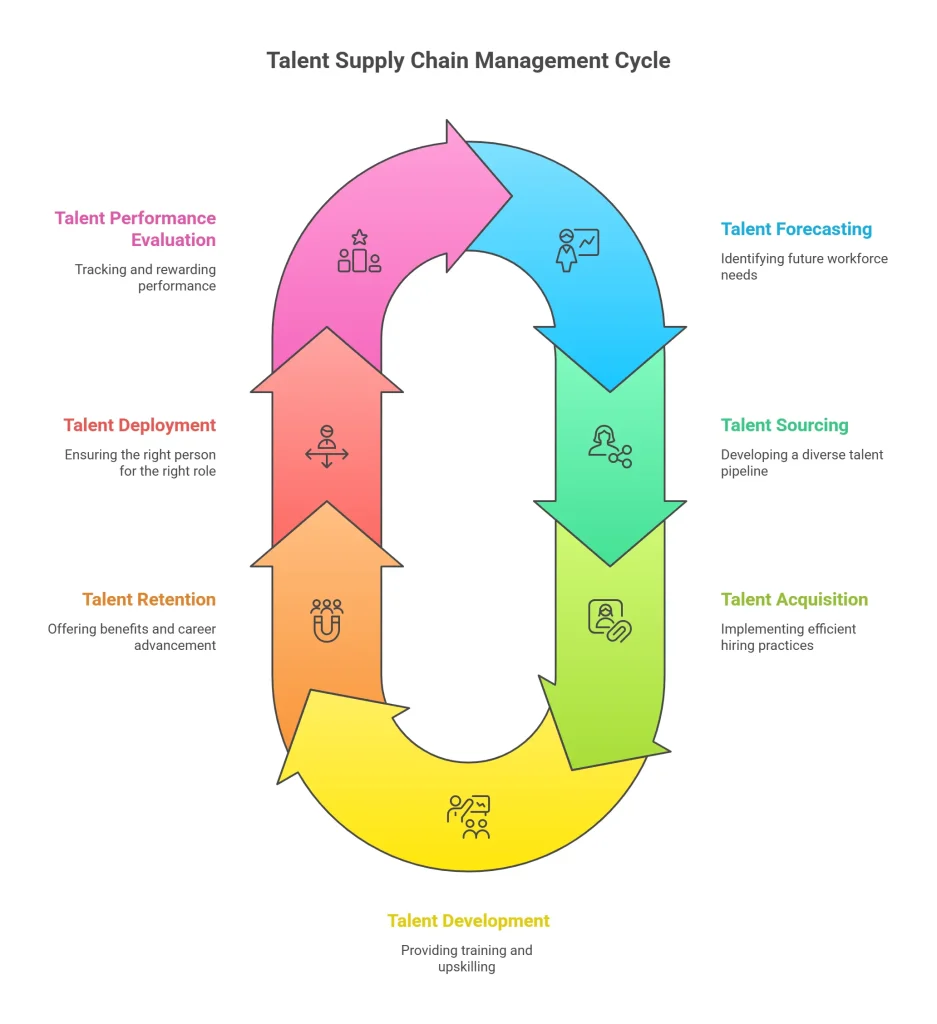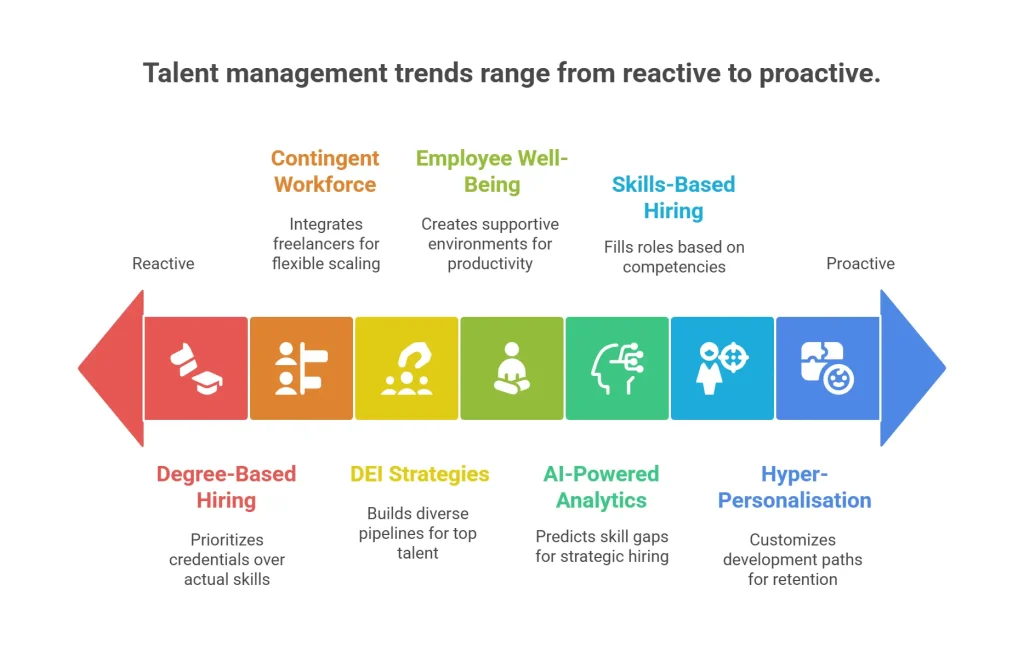In today’s dynamic business environment, the concept of managing talent has evolved beyond traditional recruitment and retention. Companies are increasingly adopting talent supply chain management to strategically address workforce needs, improve efficiency, and maintain a competitive edge. But what exactly is talent management, and why is it becoming a game-changer for businesses worldwide?
Understanding Talent Supply Chain Management
Human resource management is a strategic approach to workforce planning that aligns talent acquisition and management with business goals. It is analogous to traditional supply chain management, where the primary focus is to ensure the right talent is available at the right time and place, just as raw materials and products are in a manufacturing supply chain.
This method integrates talent acquisition, development, and retention into one cohesive strategy. It involves analyzing future talent needs, identifying potential gaps, and creating a flexible, responsive workforce model. Businesses leveraging talent supply chain management can better align their human resources with market demands and long-term objectives.
Why is Talent Workforce Management Important?
1) Enhanced Agility and Flexibility
In an unpredictable market, organizations need to be agile. Talent supply chain management allows businesses to proactively respond to changes by forecasting skill demands and developing a talent pipeline accordingly.
2) Cost Efficiency
By effectively managing the workforce, companies can reduce recruitment costs and minimize downtime, ensuring that positions are filled without unnecessary expenditure.
3) Improved Retention – SCM Talent
A well-planned talent strategy helps identify key employees and offers them growth opportunities, reducing turnover. This boosts employee morale, helping them to stay motivated and perform fully.
4) Data-Driven Decisions
Utilizing analytics in talent supply chain management allows companies to make data-driven decisions regarding hiring, training, and succession planning. This creates robust decision-making that is based on hardcore data.
Key Components of Talent Supply Chain Management

To successfully implement talent management, companies need to focus on several core components:
1. Talent Forecasting
- Identifying current and future workforce needs.
- Analyzing industry trends and technological advancements.
- Creating a skills inventory to map competencies within the organization.
2. Talent Sourcing
- Developing a diverse and sustainable talent pipeline.
- Building relationships with educational institutions and recruitment partners.
- Leveraging social media and job boards to reach potential candidates.
3. Supply Chain Talent Acquisition
- Implementing efficient hiring practices to attract top talent.
- Enhancing candidate experience through systematic wellness programmed.
- Utilizing AI-driven recruitment tools to streamline the process.
4. Talent Development
- Providing training and upskilling opportunities.
- Encouraging continuous learning to adapt to evolving job roles.
- Implementing mentorship programs to foster career growth.
5. Talent Retention
- Offering competitive benefits and career advancement.
- Conducting regular performance evaluations and feedback sessions.
- Building a positive and inclusive workplace culture.
6. Talent Deployment
- Ensuring the right person is appointed for the right role.
- Facilitating smooth transitions during internal transfers or promotions.
- Managing workload distribution effectively.
7. Talent Performance and Evaluation
- Tracking employee performance against set benchmarks.
- Addressing skills gaps through targeted training.
- Recognizing and rewarding high performers to maintain motivation.
Challenges in Talent Supply Chain Management
While the advantages are clear, talent supply chain management also presents some challenges:
1) Data Management Issues
Managing large volumes of talent data can be overwhelming, particularly if systems are not integrated.
2) Resistance to Change
Employees and managers may resist new practices, especially if the system replaces traditional HR methods.
3) Skill Mismatch
Despite thorough planning, skill mismatches can still occur, leading to reduced productivity.
4) Market Volatility
Economic changes can disrupt planned strategies, requiring companies to quickly adapt their talent plans.
Best Practices for Implementing Talent Supply Chain Management
Talent management is a multifaceted approach. Here are the best practices that companies can adopt for successful implementation:
1. Integrate Technology
Integrate AI, sensors, and software to track and monitor workflows.
2. Foster Collaboration
Encourage HR and department heads to work closely on talent strategies.
3. Continuous Learning
Implement learning management systems to support skill development.
4. Build a Culture of Adaptability
Create an inclusive culture and train leaders to adopt a flexible, adaptive, and resilient environment.
5. Measure and Adjust
Regularly assess the effectiveness of talent management strategies and make necessary adjustments.
Real-Life Example: How Talent Management Transformed a Company

A global tech firm faced frequent challenges with skill shortages, resulting in project delays. By adopting talent supply chain management, they mapped out their future skill requirements and collaborated with educational institutions to create a steady talent pipeline. As a result, they reduced hiring costs by 30% and maintained project timelines effectively.
Latest Trends in Supply Chain Talent Management
The world of talent management is rapidly evolving with emerging technologies and shifting workforce expectations. Here are some of the latest trends shaping the industry:
1) AI-Powered Talent Analytics
Advanced analytics tools are being integrated into talent strategies to predict skill gaps, optimise workforce planning, and identify high-potential candidates. Artificial intelligence (AI) is now capable of analysing vast amounts of data to forecast talent needs with high accuracy, enabling more strategic hiring decisions.
2) Contingent Workforce Integration
The gig economy is reshaping how companies view their talent pools. Talent supply chain management now includes not just full-time employees but also freelancers, contractors, and gig workers, offering organizations the flexibility to scale up or down based on project demands.
3) Skills-Based Hiring Over Degree-Based Hiring
More organisations are prioritising skills over traditional degrees. This shift allows companies to fill roles based on competencies and experience, enhancing the adaptability of the workforce.
4) Diversity, Equity, and Inclusion (DEI) Strategies
Modern talent management emphasises DEI as a key component. Businesses are focusing on building diverse pipelines and creating inclusive environments to attract top talent from various backgrounds.
5) Hyper-Personalisation of Employee Development
Just as marketing has embraced hyper-personalization, workforce management is adopting personalized career development paths. This includes customized learning opportunities, targeted mentorship, and individualized growth plans to boost retention and employee satisfaction.
6) Blockchain for Talent Verification
Blockchain technology is emerging as a secure method to verify employee credentials, reducing the time and cost associated with background checks and skill validation.
7) Focus on Employee Well-Being and Work-Life Balance
Post-pandemic shifts have heightened the focus on employee well-being. Organisations are leveraging talent retention strategies to create flexible work arrangements and supportive environments that promote mental health and productivity.
Conclusion
In a competitive business landscape, talent supply chain management is more than just a trend , it’s an essential strategy for sustainable growth. By adopting a proactive approach to workforce planning, companies can enhance productivity, reduce turnover, and ensure they have the right people in place to meet evolving demands.
As organizations increasingly focus on agility and resilience, workforce management will continue to play a crucial role in their success. Do you need tailored supply chain optimization strategies? Contact Qodenext today.
FAQS – Talent Supply Chain Management
1. What industries benefit most from workforce planning and management?
Industries like IT, healthcare, manufacturing, and logistics significantly benefit due to their dynamic workforce requirements.
2. Is talent flow management only relevant for large enterprises?
No, small and medium-sized enterprises (SMES) can also benefit by improving workforce planning and reducing hiring costs.
3. How does technology support strategic workforce planning?
Technologies like AI and big data analytics help in talent forecasting, performance tracking, and identifying skills gaps.
4. Can human capital supply chains help reduce employee turnover?
Yes, by focusing on career development and job satisfaction, it directly impacts retention rates.
5. How long does it take to implement a talent management system?
It varies based on company size and complexity, but usually takes a few months to a year for full integration.






